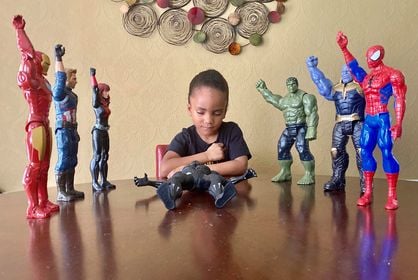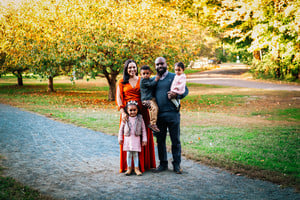Chadwick Boseman, the beloved actor most famous for his role as T'Challa in "Black Panther," died from colon cancer on August 28. It's a disease that disproportionately affects the Black community, and — in particular — young Black men.
Boseman, who also starred in many other movies, including "42" and "Marshall," was just 43 when he died, and had been reportedly fighting colon cancer for four years. That means he was well below the recommended regular screening age of 45 when he was first diagnosed.
"Colorectal cancer is the second deadliest cancer in the country," Dr. Durado Brooks, vice president of prevention and early detection at the American Cancer Society said in a press release. "This disease is ravaging the Black community."
African Americans are 20 percent more likely to get colon cancer and 40 percent more likely to die from colon cancer than other groups, according to a report from the American Cancer Society.
The report shows Black men in particular are at the greatest risk — they are nearly 50 percent more likely to die of colon cancer than white men.
Story continues below...
Losing a hero
As a mom of Black sons, losing a man like Chadwick Boseman — who became a symbol of greatness for so many through his stellar performances of iconic Black people and characters — is hard to fathom.
I loved him for the obvious, but posthumously, I respect him even more. His role as Black Panther showed our kids that anyone could be a hero, but how he lived his life teaches us that you can do anything you set your mind to doing.
Sadly, my boys are familiar with death, having lost several close relatives, so it was no question that I’d share his death with them. I explained the difference between a character and a real person to my little one, Kollin (pictured above), and told him that this doesn’t necessarily mean that Black Panther is dead. There will be others to come, and they will also do a great job because the power to be good lives within all of us.
— Kristen Wright-Matthews, publisher of Macaroni Kid College Park-East Point-Morrow, Ga.
Here's what the American Cancer Society wants you to know about colon cancer:
When to advocate for earlier screening
Boseman's death highlights the fact that rates of colorectal cancer in younger age groups is on the rise. In 2020, 12 percent of colorectal cancer cases will be diagnosed in people under 50. Adults between the ages of 20 to 39 have experienced the steepest increase in colorectal cancer rates since the 1980s.
Those with higher risk should, with input from their physician, consider screening earlier than the age of 45.
The American Cancer Society says higher risk factors include:
- Family history of colorectal cancer or certain types of polyps
- Personal history of colorectal cancer or certain types of polyps
- Personal history of inflammatory bowel disease (ulcerative colitis or Crohn's disease)
- Known family history of a hereditary colorectal cancer syndrome such as familial adenomatous polyposis (FAP) or Lynch syndrome (also known as hereditary non-polyposis colon cancer or HNPCC)
- Personal history of radiation to the abdomen (belly) or pelvic area to treat a prior cancer
When to call a doctor immediately
There are signs and symptoms of colorectal cancer to watch for. Those include:
- Concerning abdominal or gastro-intestinal symptoms, such as a change in bowel habits, that last for more than a few days
- Rectal bleeding
- Blood in the stool
- Cramping or abdominal pain
- Weakness and fatigue
- Unintended weight loss
Read more about signs and symptoms of colorectal cancer.
What causes colon cancer?
Many lifestyle-related factors have been linked to colorectal cancer. In fact, the links between diet, weight, and exercise and colorectal cancer risk are some of the strongest for any type of cancer, according to the American Cancer Society.
Not smoking, avoiding alcohol use, and following a healthy eating pattern that includes plenty of fruits, vegetables, and whole grains, and that limits or avoids red and processed meats and sugary drinks can lower your risk.
But it's important to note that not all people who develop colorectal cancer have these risk factors and doctors aren't sure why.
“The bottom line is we just don’t know,” Dr. Robin B. Mendelsohn, co-director of the Center for Young Onset Colorectal Cancer at Memorial Sloan Kettering Cancer Center, told the New York Times. The New York Times reported that Dr. Mendelsohn and her colleagues are exploring whether diet, medications like antibiotics, and the microbiome — which have all changed significantly for generations born in the 1960s and later — might be contributing to the cancer in younger people.
When found early, survival rate is 90 percent
All people ages 45 and over should be screened regularly for colon cancer.
"It is as important as ever that everyone has access to and is receiving the recommended screenings. Even during the coronavirus pandemic, necessary screening tests remain available to prevent the disease or find it at an early, more treatable stage," Dr. Brooks says.
Screening can prevent colorectal cancer by finding and removing growth, called polyps, in the colon and rectum before they become cancer. It can also find colorectal cancer early, when it is small, hasn't spread, and may be easier to treat. When found early, before it has spread, the 5-year relative survival rate is 90 percent.
Chadwick Boseman seems to have lived his life offscreen as he did onscreen — a hero, both in his words and his actions. Hopefully his tragic death leads to awareness — about the very real risk of colorectal cancer, especially among young Black men. We don't want to lose any more heroes to this terrible disease.

Will Smith gets a colonoscopyWant to know what it's like to get a colonoscopy? Check out this video Will Smith made documenting his first colonoscopy: |




